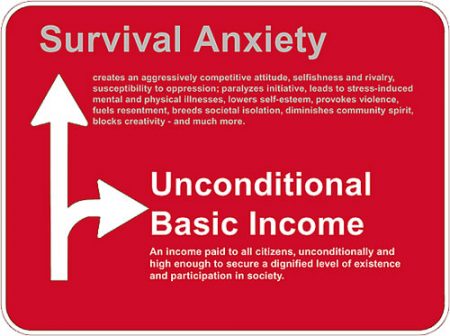December 11, 2016 – The idea of a universal basic income is one that is being looked at by many jurisdictions as they address the impacts of technology on work opportunity. Earlier this year I wrote about an article appearing in The Guardian addressing this subject. Peter Diamandis in looking at the social implications of disruptive technological innovation has added his voice to this subject. Please enjoy and feel free to comment. Do you see universal basic income as the panacea to what will increasingly be an automated world?
Some fear that robots and AI will steal our jobs. They probably will (in the near-term, at least half of them). If that happens, what will we do for a living? How will we earn money?
In this blog I discuss one of the most important proposed solutions to job loss due to automation — the notion of Universal Basic Income (UBI) or guaranteed minimum income. In specific, I want to discuss:
- Predictions on job loss
- What it is and who is experimenting with it?
- Does it work and what are the implications?
Predictions on Job Loss
In 2013, Dr Carl Benedikt Frey of the Oxford Martin School estimated that 47% of jobs in the United States are “at risk” of being automated in the next 20 years. This figure was recently verified recently by McKinsey & Company who suggest that 45% of today’s jobs will be automated by using exponential technologies such as machine learning, artificial intelligence, robotics and 3D printing.
The concept is called technological unemployment, and most careers, from factory workers and farmers to doctors and lawyers, are likely to be impacted. The impact will likely be even more severe in the Developing World. The expected implications of technological unemployment will vary widely.
Individuals like Ray Kurzweil and venture capitalist Marc Andreessen believe that while today’s jobs will perish, new jobs will be created by technology to replace them. Other experts project that technological unemployment will be massively disruptive to society. Still others believe that society will adapt, first by constantly demonetizing our cost of living and next by the the widespread deployment of UBI.
What is UBI?
UBI is a government delivered program where citizens within a country regularly receive an unconditional sum of money in addition to any income received from other means. UBI’s core motivation is to address social ills by giving people “free” money. It is certainly not a new idea. For some perspective, Thomas Paine outlined a plan in his 1797 essay “Agrarian Justice” to create a national fund making payments of 15 pounds sterling to each adult over 21 years old.
Today, experiments with UBI are spreading across the world, from Finland and the Netherlands to Canada and France. In France, several members of Parliament have supported running an experiment, and the finance minister is open to it. And in the last decade, eight countries have formally experimented with UBI. Here are three active experiments worth noting:
- Finland: Early in 2017 the Finnish government will launch an experiment in which a randomly selected group of ~3,000 citizens already on unemployment benefits will begin to receive a monthly basic income of 560 Euros (approx. $600). That basic income will replace existing benefits. The amount is the same as the current guaranteed minimum level of Finnish social security support. The pilot study will run for two years. The goal is to assess whether basic income can help reduce poverty, social exclusion and bureaucracy, while increasing the employment rate.
- Netherlands: The local government in the Dutch city of Utrecht is planning to conduct an experiment that would give guaranteed monthly income to 250 Dutch citizens currently receiving government benefits. A two-year test period is tentatively set to begin in January of 2017 with the selected citizens in Utrecht and nearby cities getting a flat sum of 960 Euros per month (about $1,100). The Utrecht proposal — called “Weten Wat Werkt,” or “Know What Works” includes six test groups. The members in each group will receive slightly different stipends under slightly different conditions. In addition to the group that will receive 960 Euros per month without any work obligation there is a group that will be given that, plus an additional 150 Euros at the end of the month if they provide volunteer services such as doing maintenance work on schoolyards.
- India: Over 350 million people (about 30% of the population) remain below the poverty line after two decades of high economic growth. With this in mind India in 2011 launched two pilots to test the impact of basic income grants funded by UNICEF, with SEWA as coordinator. In eight villages in Madhya Pradesh, every man, woman, and child was provided with a monthly payment of 200 rupees initially to adults and 100 rupees paid to children’s mothers or guardians. The payments escalated to 300 and 150 rupees respectively. Similar schemes were tried in tribal villages, where for 12 months every adult was paid 300 rupees a month and every child 150. The money was paid initially as cash and after three months was put into bank or cooperative accounts on behalf of the recipients.
- In January 2016, Sam Altman, the president of Y Combinator, announced that a San Francisco-based startup fund was organizing a basic income study to be launched in the United States.
Does UBI work?
While the implementation of UBI at scale is still in its early days, the results are promising. Early results in the India experiment show nutrition was improved as measured by the average weight-for-age of young children (World Health Organization z-score), and more so among girls. In the same study, the UBI grants have led to more labor and work, not less, as expected by skeptics. There is a shift from casual wage labor to more self-employed farming and business activity with less distress-driven migration out of the region. Women have gained more than men.
That being said, the most compelling study demonstrating how universal basic income can work comes from a small town in Canada. From 1974 to 1979, the Canadian government partnered with the province of Manitoba to run an experiment in providing a minimum income to residents called MINCOME. MINCOME was a guaranteed annual income offered to every eligible family in Dauphin, a town of 10,000. A smaller numbers of residents in Winnipeg and some rural communities in Manitoba were also included in the study .
So what happened to families receiving MINCOME?
- They had fewer hospitalizations
- They had fewer accidents and injuries
- Mental health hospitalizations fell dramatically
- High school graduation rates increased
- Younger adolescent girls were less likely to give birth before age 25, and when they did, they had fewer kids
The program brought most recipients above Canada’s poverty line. The employment effects in Dauphin were modest. For primary earners, those with full-time jobs, there was virtually no decline in work. Essentially, nobody quit their jobs. The cash from the government eased families’ economic anxiety, allowing them to invest in their health and do longer-term planning. The MINCOME experiment is now serving to inspire Ontario and Nova Scotia, two of Canada’s provinces to revive the basic income pilot this year.
Implications
I’m fairly confident that in the near future, as technology continues to eliminate traditional jobs and massive new wealth gets created, we are going to see some version of UBI deployed on a larger scale. While I think the implications of UBI are mostly positive, there are many complexities associated with its rollout. Many questions remain unanswered. For example, where is the additional money to come from? Taxes? Will UBI cause problems we can’t anticipate or will it create more conflict than it resolves? Can governments react quickly enough to job losses given the pace of innovation and automation in technology? Is it actually a solution to technological unemployment? Or will we still have to go through a turbulent, violent period as we redistribute our labor in a world of robots and AI?
At minimum, I believe that with decreased costs of living, UBI will be one of many tools empowering self-actualization at scale. More people will be able to follow their passions, be more creative, and spend more time on higher-order, personally fulfilling tasks. When this happens, we’ll be one step closer to a world of abundance.

















Finland has announced it will start a pilot project with 2,000 randomly chosen unemployed. Oakland, California has started a 100 family trial providing $2,000 per month. Amsterdam and a revival of a basic income pilot in Canada may soon follow. Read:
https://www.technologyreview.com/s/603186/in-2017-we-will-find-out-if-a-basic-income-makes-sense/?utm_source=MIT+TR+Newsletters&utm_campaign=f9e566c512-EMAIL_CAMPAIGN_2016_12_21&utm_medium=email&utm_term=0_997ed6f472-f9e566c512-153895549&goal=0_997ed6f472-f9e566c512-153895549&mc_cid=f9e566c512&mc_eid=71bcf1c4eb